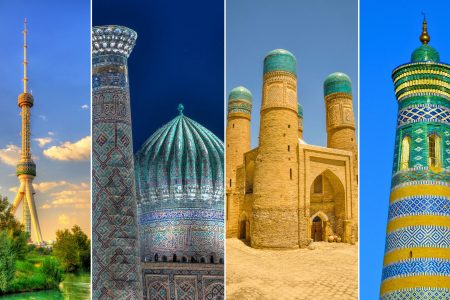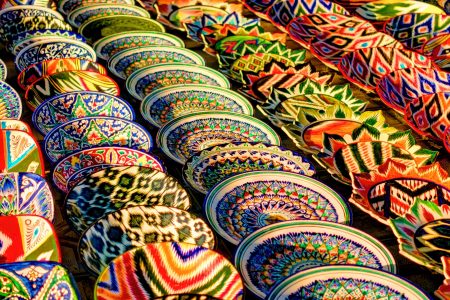10.3 million
Official: Azerbaijani
Baku
Borders: Russia, Georgia, Armenia, Turkey
Manat (AZN)
Winter (Cold); Summer (Dry and Hot)
Azerbaijan is a country located at the crossroads of Eastern Europe and Western Asia in the Caucasus region. Baku is the capital of Azerbaijan, and it is also the country’s largest city. The official language is Azerbaijani, also known as Azeri Turkish. The majority of the population practices Islam, predominantly the Shiite branch. Azerbaijan has a rich history, with Persian, Ottoman, and Russian influences throughout the centuries. It was part of the Russian Empire before becoming a Soviet republic in 1920 and regained its independence with the dissolution of the Soviet Union in 1991. Azerbaijan’s economy is heavily influenced by its oil and natural gas reserves, and the country has experienced significant economic growth in recent years. Azerbaijan is characterized by geographic diversity, with mountains, plains, and the Caspian Sea bordering part of the country. Azerbaijani culture is marked by a rich tradition of music, art, and literature. Azerbaijani carpets are also renowned worldwide.
One of the most notable aspects of Azerbaijan’s recent history is the conflict over Nagorno-Karabakh with Armenia. In 2020, a ceasefire agreement was reached after decades of tensions and armed conflicts.
AZERBAIJANI CULTURE
The culture of Azerbaijan is a dynamic blend of Turkish, Persian, and Russian influences, reflecting its geographical location and tumultuous history. Music holds a significant place in Azerbaijani culture, with mugham, a genre of traditional music, being particularly famous. Traditional instruments such as the tar (string instrument) and kamancha (bowed string instrument) are commonly used. Azerbaijani traditional dances are often energetic and rhythmic, with Lezginka being one of the most famous, characterized by fast movements and jumps. Azerbaijani carpets are renowned worldwide. Patterns and techniques vary by region, and each carpet tells a unique story. Pottery craftsmanship is also popular.
Azerbaijan has a rich literary tradition dating back centuries. Classical poets like Nizami Ganjavi are revered, and poetry plays a significant role in the culture. Azerbaijani cuisine is diverse and delicious, featuring popular dishes such as plov (rice pilaf), dolma (stuffed vine leaves), and kebabs. Persian and Turkish influences are evident in many dishes. The Azerbaijani language is rich in poetry and prose, with Azerbaijani literature having a long history, and modern writers continuing to contribute to this tradition. Azerbaijanis celebrate various national and religious holidays. Novruz Bayramı, the Persian New Year, is one of the most significant holidays, marking the beginning of spring. Cultural festivals, art exhibitions, and musical events are regularly organized, showcasing the nation’s cultural richness. Azerbaijan attracts tourists with its historical sites, diverse landscapes, and modern attractions such as the Flame Towers in Baku.
AZERBAIJANI FLAVORS
Azerbaijani cuisine is rich in flavors, featuring a delicate combination of herbs, spices, and fresh ingredients. Influenced by Turkish, Persian, and Russian culinary traditions, Azerbaijani cuisine offers a variety of delicious dishes. Here are some iconic elements of Azerbaijani cuisine:
Azerbaijani cuisine offers a diverse culinary experience, combining ancient traditions and regional influences. It serves as a window into the culture and history of the country, with each dish telling a unique story.
DIVERSITY IN TOURISM
Azerbaijan offers a variety of tourism experiences, reflecting its rich natural resources, ancient history, and cultural attractions. Cultural Tourism : Explore historic cities such as Baku, with its Old Town (Icherisheher), the Palace of the Shirvanshahs, and other cultural sites. Museums, art galleries, and cultural festivals provide enriching experiences. Historical Tourism: Discover ancient history at sites like the Sheki Palace, Baku’s Old Town, the Nizami Mausoleum, and the petroglyphs of Gobustan National Park. Natural Tourism: Nature enthusiasts can explore national parks, the Caucasus Mountains, lakes like Goygol, and the Guba Reserve. Absheron Peninsula offers diverse landscapes. Adventure Tourism : Mountains and national parks provide opportunities for hiking, climbing, winter skiing, mountain biking, and more. Shahdag National Park is particularly popular for outdoor activities. Thermal and Wellness Tourism: Azerbaijan boasts natural thermal springs, especially in the Naftalan region. Some hotels and wellness centers offer spa treatments using oil-based products. Religious Tourism: Explore religious sites such as the Ateshgah Fire Temple, a Zoroastrian place of worship, and various historical mosques. Culinary Tourism: Food enthusiasts can savor Azerbaijani flavors by trying traditional dishes like plov, dolma, kebabs, and sweet delights such as pakhlava. Business Tourism: Baku, as the economic hub of the region, attracts business travelers with modern infrastructure and commercial opportunities. Event Tourism: Cultural events, festivals, and exhibitions draw visitors globally. The Baku International Film Festival is a major cinematic event. Cruise Tourism: The Caspian Sea offers cruise opportunities, exploring the picturesque coasts of Azerbaijan. Bird Watching Tourism: The Guba Reserve and other natural areas are prime locations for observing a variety of migratory birds.
Azerbaijan, with its geographical and cultural diversity, provides a plethora of travel experiences tailored to different interests and preferences of travelers.
DIVERSE TOURIST SITES IN AZERBAIJAN
Azerbaijan boasts a plethora of diverse tourist sites, ranging from the historically rich Old Town of Baku to the breathtaking natural landscapes of Gobustan National Park.
These sites offer a diverse glimpse of Azerbaijan, from historical and cultural treasures to unique natural wonders. Whether exploring the Old Town of Baku, discovering prehistoric rock carvings, or enjoying mountainous landscapes, Azerbaijan provides a rich and varied tourist experience.



